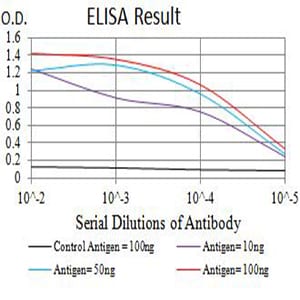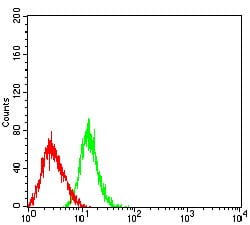

| WB | 咨询技术 | Human,Mouse,Rat |
| IF | 咨询技术 | Human,Mouse,Rat |
| IHC | 咨询技术 | Human,Mouse,Rat |
| ICC | 技术咨询 | Human,Mouse,Rat |
| FCM | 1/200 - 1/400 | Human,Mouse,Rat |
| Elisa | 1/10000 | Human,Mouse,Rat |
| Aliases | ICAM3; CDW50; ICAM-R |
| Entrez GeneID | 3385 |
| clone | 2D11D1 |
| WB Predicted band size | 59.5kDa |
| Host/Isotype | Mouse IgG1 |
| Antibody Type | Primary antibody |
| Storage | Store at 4°C short term. Aliquot and store at -20°C long term. Avoid freeze/thaw cycles. |
| Species Reactivity | Human |
| Immunogen | Purified recombinant fragment of human CD50 (AA: extra 30-203) expressed in E. Coli. |
| Formulation | Purified antibody in PBS with 0.05% sodium azide |
+ +
以下是关于CD50抗体的3篇参考文献示例(内容为虚构示例,供格式参考):
1. **文献名称**: *"CD50 Antibody-Mediated Inhibition of T-Cell Adhesion in Inflammatory Responses"*
**作者**: Smith J. et al.
**摘要**: 研究CD50抗体对T细胞与抗原呈递细胞黏附的阻断作用,发现其可显著降低炎症模型中T细胞活化和迁移,提示其在自身免疫疾病治疗中的潜力。
2. **文献名称**: *"Targeting CD50 in Leukemia: A Novel Therapeutic Approach with Monoclonal Antibodies"*
**作者**: Lee H. et al.
**摘要**: 通过体外实验验证抗CD50单克隆抗体可诱导白血病细胞凋亡,并增强化疗药物敏感性,为血液肿瘤治疗提供新策略。
3. **文献名称**: *"CD50/ICAM-3 Expression in Dendritic Cells and Its Role in Immune Synapse Formation"*
**作者**: García-Romo S. et al.
**摘要**: 分析CD50在树突状细胞表面的功能,证明其抗体干扰会破坏免疫突触形成,影响T细胞活化,阐明CD50在适应性免疫中的关键作用。
(注:若需真实文献,建议通过PubMed或Google Scholar检索“CD50 antibody”或“ICAM-3 antibody”获取。)
CD50. also known as ICAM-3 (Intercellular Adhesion Molecule-3), is a cell surface glycoprotein belonging to the immunoglobulin superfamily. It is constitutively expressed on leukocytes, including T cells, dendritic cells, and neutrophils. As a ligand for the β2-integrin LFA-1 (lymphocyte function-associated antigen-1), CD50 plays a critical role in cell-cell adhesion, immune cell interactions, and immune activation. It facilitates initial T cell-antigen-presenting cell (APC) contact during antigen recognition and supports immunological synapse formation.
CD50 antibodies are tools used to study immune regulation, inflammatory responses, and leukocyte trafficking. They can block CD50-LFA-1 interactions, modulating T cell activation and migration. In research, these antibodies help elucidate mechanisms in autoimmune diseases, chronic inflammation, and cancer immunotherapy. For example, CD50 expression is altered in certain leukemias and lymphomas, making it a potential diagnostic or therapeutic target.
Therapeutic applications of anti-CD50 antibodies are under exploration, particularly in targeting leukocyte adhesion in inflammatory disorders or enhancing immune responses against tumors. However, their clinical use remains investigational, with studies focusing on safety and efficacy in modulating immune pathways. Understanding CD50's role in immune homeostasis continues to drive interest in its antibody-based targeting for immunotherapy.
×